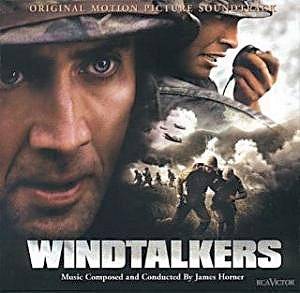************************************************************** EDITOR’s RECOMMENDATION June 2002 **************************************************************
James HORNER
Windtalkers
Indian flutes, Phil Ayling - Harmonica, Tommy Morgan
music conducted by the composer
RCA-BMG 09016 63867-2 [66:57]

Windtalkers is a much delayed John Woo WWII action adventure, originally scheduled for release last September but, held up like Collateral Damage by post 11-9-2001 sensitivities. What this means is that James Horner's score was composed before his work on Iris (2001) and A Beautiful Mind (2001), and following his contribution to Enemy at the Gates (2001). Thus he preceded his recent duo of biopics about geniuses with mental health problems with a duo of movies based on events from the Second World War. One can only hope that Windtalkers is better than Enemy at the Gates. The film does after all reunite Woo with Nicholas Cage, with whom he achieved his career best in Face/Off (1997), though it also follows his career worst, the execrable Mission: Impossible 2 (2000).
James Horner's score receives the sort of treatment we have become used to on CD from this composer. Which is to say a lengthy album (66 minutes) filled with lengthy cues; three run for between seven and eight minutes, the finale plays for over ten. It's a big, lush, dramatic full orchestral work, with just the very occasional touch of electronics. Continuing from Enemy at the Gates, Horner is still paying homage to, or borrowing from, the great 20th century Russian composers. As with the previous score, references to Prokofiev's Alexander Nevsky (1938) are clearly in evidence (try opening cue "Navajo Dawn" at 2.52), while the snare led clamour of the action music suggests more than a passing familiarity with Shostokovitch's symphonies.
The film concerns the role of Navajo "Windtalkers" as carriers of an unbreakable code during the American war in the Pacific. As such Horner begins and ends his score mixing a lone Native American voice into the score - a voice which sounds much more authentic than Michael Legrand's efforts on The Man Who Loved Cat Dancing (reviewed this month).
As with the scores to many recent war films, there is an avoidance of the traditional big theme, melodic material being in the form of motifs, the development taking a fugal approach akin to the suspense-action writing in Ron Goodwin's fine Where Eagles Dare 1968). Even so, the disc generally holds the interest from the atmospherics and brooding military texturing of "Navajo Dawn" to the closing "Calling to the Wind", a piece which dispatches Horner's regular duty of underscoring the dignity and honour of self-sacrifice and death, cf. Legends of the Fall (1994), Braveheart (1995), Titanic (1997), etc.
From the opening mood there is something which recalls Horner's finest work, on Legends of the Fall. Though both the folk element and the grand melodies are absent in some ways this feels like Legends of the Fall II, the story moved on a war later and stripped of any sense of romance. There is a sombre introspection to the early parts of "An Act of Heroism" which recalls the more delicate moments of the earlier score, are a clean limbed, almost Coplandesque quality in places which makes the music seem like a cross between that for a classic Western and stark WWII drama. The Western elements being enhanced by a wooden flute, seeming rather more appropriate than the shakuchai Horner has employed in the past, and harmonica.
It is with the fourth cue, "Taking the Beachhead" that the action begins, and there is a slow burning tension, heroism and excitement which raises hopes for the film. The pulsating rhythms of the action cues, together with some majestic brass, call to mind both, again, Legends of the Fall and the propulsive sections from Titanic and have a tautness entirely lacking from the moribund Enemy at the Gates. "The Night Before" introduces a delicate and most effective little questioning motif, presumably setting the doubt and resignation of men about to face combat, while the latter part of the album then unfolds in a series of lengthy pieces; "Marine Assault", "Losses Mounting", "Friends in War" and "A Sacrifice Not Forgotten", leading to the moving finale. The music is rarely less than involving, though it is a long disc and lacks the variety to entirely sustain its length. Even so, coming from this very uneven composer this is a serious return to form after its immediate predecessor, and on CD a stirring "big" score after the smaller scale gem that was Iris.
Gary S. Dalkin

Return to Index